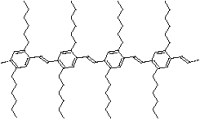
Organic electronics are electronic components made from plastics. Polymers are expected to replace conventional materials such as silicon in the low-budget market. This is expected to reduce the cost of items such as LEDs and intelligent labels for products in supermarkets. It also allows the production of flexible electronic circuits and electronic chips. Recent progress has allowed the fabrication of OFETs (organic field effect transistors), OLEDs (organic light emitting diodes) and simple organic ciruits. However, the fabrication methods are still too expensive for mass production and the lifetime of such components is still too short and their efficiency too low. It will probably take at least another decade to solve the challenges that plastic electronics are currently facing. My goal is to develop an organic circuit that can be drawn onto a substrate and I will conduct experiments with my organic electronic components.
This goal may seem too challenging for an eighth grader, however, the motto "dreamed, thought, done" of the 2003 "Jugend forscht" contest encouraged me to dream.